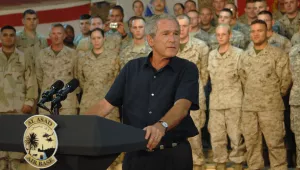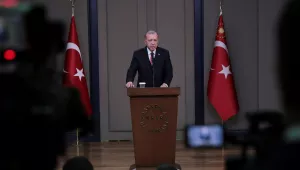Can Saddam Be Contained? History Says Yes
John J. Mearsheimer
Stephen M. Walt
November 12, 2002
Should the United States invade Iraq and depose Saddam Hussein? Over the past few months, advocates of war have advanced a number of reasons why toppling Saddam is desirable. He is a bloodthirsty tyrant. He has defied the United Nations on numerous occasions. He has backed terrorists in the past. Removing him will reinforce respect for American power and spark democratic reform in the Middle East. If you’re looking for a reason to support a war, in short, there are plenty from which to choose.
Most of these reasons are not convincing, however. True, Saddam is a cruel despot, but plenty of other leaders have bloody hands and we aren’t thinking about going after them. Yes, Iraq has defied numerous UN resolutions, but so have a number of other countries and this sin is hardly sufficient justification for war. Granted, Iraq has harbored terrorist organizations in the past, but the groups it has supported do not pose much of a threat to the United States, and eliminating Saddam would not eliminate them. A successful war might trigger a wave of democratic reforms in the Arab world, but a bitter anti-American backlash is more likely. If these reasons were the only ones that advocates of war could offer, their campaign would never have gotten off the ground.
But advocates of preventive war do have a trump card. They maintain that Saddam’s past behavior proves that he is too reckless, relentless, and aggressive to be allowed to possess weapons of mass destruction (WMD), and especially nuclear weapons. They sometimes acknowledge that war against Iraq might be costly, might lead to a lengthy U.S. occupation, and might complicate U.S. relations with many other countries. But these concerns are dwarfed by the belief that Saddam is simply too dangerous to be deterred or contained if he acquires nuclear weapons. For that reason alone, he has to go.
Interestingly, even many opponents of preventive war seem to agree that Saddam cannot be deterred, and therefore must not be allowed to get nuclear weapons. Instead of invading Iraq and overthrowing the regime, however, these moderates support using the threat of an attack to compel Saddam to permit the resumption of UN weapons inspections. Their hope is that inspections will eliminate any hidden WMD stockpiles and production facilities and ensure that Saddam cannot acquire any of these deadly weapons in the future. This motivation explains why skeptical U.S. congressmen nonetheless voted in favor of a resolution authorizing the use of force, and it also explains why the UN Security Council eventually passed a resolution threatening military action if Iraq did not allow inspectors back in. In short, both the hardline preventive war advocates and the more moderate supporters of inspections accept the same basic premise: Saddam Hussein is not deterrable, and he cannot be allowed to obtain a nuclear arsenal.
There is only one problem with this argument: it is almost certainly wrong.
The belief that Saddam’s past behavior shows that he cannot be contained rests on distorted history and dubious logic. In fact, the historical record shows that the United States can contain Iraq effectively—even if Saddam has nuclear weapons—just as it contained the Soviet Union during the Cold War. And that conclusion carries an obvious implication: there is no good reason to attack Iraq at this time.
Is Saddam Another Hitler?
Those who now call for preventive war begin by portraying Saddam as a serial aggressor bent on dominating the Persian Gulf. Indeed, he is often compared to Adolf Hitler, who is history’s poster child for an inveterate aggressor with a limitless appetite for new conquests. The war party also contends that Saddam is either irrational or prone to serious miscalculation, which means that he may not be deterred by even credible threats to retaliate. Kenneth Pollack, a proponent of war with Iraq, goes so far as to argue that Saddam is “unintentionally suicidal.”
The facts, however, tell a different story. Saddam has dominated Iraqi politics for about thirty years. During that period, he has started only two wars against his neighbors. He invaded Iran in 1980 and Kuwait in 1990. Now compare that with Hitler. Once he had rearmed Germany, Hitler attacked Czechoslovakia and Poland in 1939, Norway, Belgium, Holland, and France in 1940, and Greece, Yugoslavia, and the Soviet Union in 1941. And to top it all off, Hitler declared war on the United States in December 1941, even though Nazi Germany was by then embroiled in a bloody campaign inside the Soviet Union and hardly needed additional enemies. By this standard, Saddam’s behavior seems rather tame.
Indeed, Saddam’s past behavior is no worse than that of several other states in the Middle East, and it may even be marginally better. Egypt fought six wars between 1948 and 1973 (five against Israel, plus the civil war in Yemen), and played a key role in starting four of them. Israel initiated wars on three occasions (the Suez War in 1956, the Six Day War in 1967, and the 1982 invasion of Lebanon), and has conducted innumerable air strikes and commando raids against its various Arab adversaries. Iraq happens to be located in a rough neighborhood, and it is hardly surprising that Saddam plays hardball, just like his neighbors.
Furthermore, a careful look at Saddam’s two main wars shows that his behavior was far from reckless. In fact, both times he went to war because Iraq was vulnerable, and because he had good reason to believe his targets were weak and isolated. In each case, his goal was to rectify Iraq’s strategic dilemma with a limited military victory. This does not excuse Saddam’s aggression, but his willingness to use force on these two occasions hardly demonstrates that he cannot be deterred.
The Iran-Iraq War
Iran was the most powerful state in the Persian Gulf during the 1970s. Iran’s strength was partly due to its large population (roughly three times that of Iraq) and its oil reserves, but it was also due to the strong support that the Shah of Iran received from the United States. Relations between Iraq and Iran were quite hostile throughout this period, but Iraq was in no position to defy Iran’s regional dominance. In fact, Iran put constant pressure on Saddam’s regime during the early 1970s, mostly by fomenting unrest among Iraq’s sizable Kurdish minority. Iraq finally got the Shah to stop meddling with the Kurds in 1975, but only by agreeing to cede half of the Shatt al-Arab waterway to Iran, a concession that underscored Iraq’s weakness at the time.
Given this history of animosity, it is not surprising that Saddam welcomed the Shah’s ouster in 1979. Indeed, Iraq went to considerable lengths to foster good relations with Iran’s revolutionary leadership. Saddam did not try to exploit the turmoil in Iran to gain strategic advantage over his neighbor and made no attempt to reverse his earlier concessions, even though Iran did not fully comply with the terms of the 1975 agreement. The Ayatollah Khomeini, on the other hand, was determined to extend his revolution across the Islamic world, starting with Iraq. By late 1979, Tehran was pushing hard to get the Kurdish and Shi’ite populations in Iraq to revolt and topple Saddam, and Iranian operatives were actively trying to assassinate senior Iraqi officials. Border clashes became increasingly frequent by April 1980, largely at Iran’s instigation.
Facing a grave threat to his regime but aware that Iran’s military readiness had been temporarily disrupted by the revolution, Saddam launched a limited war against his bitter foe on September 22, 1980. His principal aim was to capture a large slice of territory along the Iraq-Iran border, not to conquer Iran or topple Khomeini. “The war began,” as Efraim Karsh writes, “because the weaker state, Iraq, attempted to resist the hegemonic aspirations of its stronger neighbor, Iran, to reshape the regional status quo according to its own image.”
The Iran-Iraq war lasted eight years and cost the two protagonists over 1 million casualties and at least $150 billion. Iraq received considerable outside support from a number of other countries—including the United States, Kuwait, Saudi Arabia, and France—largely because these states all were determined to prevent the further spread of Khomeini’s Islamic revolution. Although the war cost Iraq far more than Saddam originally expected, it also thwarted Khomeini’s attempt to topple him and dominate the Gulf region. War with Iran was not a reckless adventure; it was an opportunistic response to a significant threat.
The Gulf War, 1990–91
But what about Iraq’s brutal invasion of Kuwait in August 1990? Perhaps the earlier war with Iran was essentially defensive, but surely this was not true in the case of Kuwait. Doesn’t Saddam’s decision to invade his tiny neighbor prove that he is too rash and aggressive to be trusted with the most destructive weaponry? And doesn’t his refusal to withdraw even when confronted by a superior coalition demonstrate that he is in fact “unintentionally suicidal”?
The answer is no. Once again, a careful look at the actual history of the Gulf War shows that Saddam was neither mindlessly aggressive nor particularly rash or reckless. If anything, the evidence suggests the opposite conclusion.
Saddam’s decision to invade Kuwait was an attempt to deal with Iraq’s continued vulnerability, and not part of a grand design to rule the Persian Gulf. Iraq’s economy was badly damaged by its earlier war with Iran (1980–88) and continued to decline after that war ended. An important cause of Iraq’s economic difficulties was Kuwait’s refusal to loan Iraq $10 billion, as well as write off the debts Iraq had incurred during its war with Iran. Saddam believed Iraq was entitled to additional aid for one simple reason: Iraq had ruined its economy in a war that had helped protect Kuwait and other Gulf states from Iranian expansionism. To make matters worse, Kuwait was overproducing its OPEC oil quotas, which drove down world oil prices and reduced Iraqi oil profits. Saddam tried using diplomacy to solve the problem, but Kuwait hardly budged. As Efraim Karsh and Inari Rautsi note, the Kuwaitis “suspected that some concessions might be necessary, but were determined to reduce them to the barest minimum.”
Saddam reportedly decided on war sometime in July 1990, but before sending his army into Kuwait, he approached the United States to find out how it would react. In a now-famous interview with the Iraqi leader, U.S. Ambassador April Glaspie told Saddam that “we have no opinion on the Arab-Arab conflicts, like your border disagreement with Kuwait.” The U.S. State Department then reinforced this message by declaring that Washington had “no special defense or security commitments to Kuwait.” The United States may not have intended to give Iraq a “green light,” but that is effectively what it did.
Given the go-ahead by Washington and given that Kuwait was no match for Iraq militarily, Saddam invaded Kuwait in early August 1990. This act was an obvious violation of international law, and the United States was justified in opposing the invasion and organizing a coalition to reverse Iraq’s aggression. But Saddam’s decision to invade was hardly the act of an irrational or reckless aggressor, given the problems he faced and the lack of any obvious obstacles to a military solution. Deterrence did not fail in this case; it was never tried.
But what about his failure to leave Kuwait once the United States did a 180-degree turn and demanded a return to the status quo ante? If Saddam is a rational and responsible leader, shouldn’t he have figured out what would happen when his army clashed with America and its allies? Wouldn’t a prudent leader have abandoned Kuwait before getting clobbered?
With hindsight, the answer seems obvious. But Saddam is not clairvoyant, and he had good reasons to hold out as long as he could. A precipitous withdrawal would have undermined his prestige at home and could have shaken the foundations of his regime. Moreover, he also had considerable reason to believe that hanging tough would work. In the months preceding the fighting, for example, it was far from obvious that the United States would actually fight. American public opinion was initially ambivalent; congressional opinion was even more divided, and most Western military experts predicted that the Iraqi army would mount a formidable defense and maybe even force the United States into a protracted war. If the fighting did drag on, there was a reasonable chance that the American-led coalition would collapse and public opinion in the United States might turn against the war. These forecasts seem foolish today, but they were almost the “conventional wisdom” before the war began. If most Americans weren’t sure how the war would go, why expect Saddam to have figured it out?
When the war began in mid-January 1991, U.S. airpower took swift aim at the Iraqi ground forces deployed in and around Kuwait. By mid-February, those forces were seriously weakened and in no position to contest the coalition’s large and powerful ground forces. Realizing that he had miscalculated, Saddam promptly began searching for a diplomatic solution that would allow him to retreat from Kuwait before a ground war began. Indeed, Saddam made it clear that he was willing to pull out immediately and return to the status quo ante. Instead of allowing Iraq to withdraw and fight another day, however, the Bush administration wisely insisted that the Iraqi army leave its equipment behind as it withdrew. As the administration had hoped, this was a deal Saddam could not accept.
There is no question that Saddam miscalculated when he attacked Kuwait, but the history of warfare is full of cases where leaders have misjudged the prospects for war. There is no evidence suggesting that Hussein did not weigh his options carefully. He chose to use force because he was facing a serious challenge and because he had good reasons to think that his invasion would not provoke serious opposition.
Nor should we forget that the Iraqi tyrant survived the Kuwait debacle just as he has survived other threats against his regime. He is now beginning his fourth decade in power. If he is really “unintentionally suicidal,” then it appears his survival instincts are even more finely honed.
Finally, history provides at least two more pieces of evidence demonstrating that Saddam is deterrable. First, although he did launch conventionally armed SCUD missiles at Saudi Arabia and Israel during the Gulf War, he did not launch chemical or biological weapons at the coalition forces that were decimating the Iraqi military. Moreover, senior Iraqi officials—including Foreign Minister Tariq Aziz and the head of military intelligence, General Wafic al-Samarrai—have testified that Iraq refrained from using its chemical weapons because the Bush administration had made ambiguous but unmistakable threats to retaliate with nuclear weapons if Iraq used WMD. Second, in 1994 Iraq mobilized the remnants of its army on the Kuwaiti border, in an apparent attempt to force a modification of the UNSCOM weapons inspection regime. But when the UN issued a new warning and the United States reinforced its forces in Kuwait, Iraq quickly backed down. In both cases, the allegedly irrational Iraqi leader was deterred.
Saddam’s Past Use of Chemical Weapons
There is a second line of argument that preventive war advocates use to convince skeptics that Saddam is an evil leader who cannot be deterred. Specifically, they point out that Saddam has used WMD against his own people (the Kurds) and against Iran, and therefore he is likely to use them against the United States. Thus, George W. Bush recently warned in Cincinnati that the Iraqi WMD threat against America “is already significant and it only grows worse with time.” The United States, in other words, is in imminent danger.
Saddam’s record of chemical weapons use is deplorable, but none of his victims had a similar arsenal and thus they could not threaten to respond in kind. Iraq’s calculations would be entirely different when facing the United States, because Washington has the capability to retaliate with WMD if Iraq ever decides to use these weapons first. Given what the United States could do in response to any Iraqi attack, Saddam has no incentive to use chemical or nuclear weapons against America and its allies, unless his survival is threatened. This simple logic explains why he did not use WMD against U.S. forces during the Gulf War and did not fire chemical or biological warheads at Israel. Furthermore, if Saddam is a tyrant who cannot be deterred, what is stopping him from using WMD against U.S. forces in the Persian Gulf, forces that have bombed Iraq repeatedly over the past decade? The bottom line: deterrence has worked quite well against Saddam in the past, and there is no reason to think that it cannot work equally well in the future.
Given this historical record, President Bush’s repeated claim that the threat from Iraq is growing ominously makes little sense, and should be viewed as a transparent attempt to scare the American people into supporting a war. CIA Director George Tenet flatly contradicted the President’s scare tactics in a letter to Congress, explaining that Saddam was unlikely to initiate a WMD attack against any U.S. target unless Washington threatened the survival of his regime. Why? Because even if Iraq did acquire a larger WMD arsenal, the United States would still retain a massive nuclear retaliatory capability. And if Saddam would use WMD only if the United States threatened his regime, then one wonders why the advocates of war are trying to do just that.
The hawks do have a fallback position on this issue. Yes, the United States can try to deter Saddam by threatening to retaliate with massive force. But this strategy may not work, because Iraq’s past use of chemical weapons against the Kurds and Iran shows that Saddam is a deeply warped human being who might use WMD without regard for the consequences.
Unfortunately for those who now favor war, this argument is difficult to reconcile with America’s past support for Iraq, support that coincided with some of the behavior that is now being invoked to portray him as an irrational madman. The United States backed Iraq during the 1980s—when Saddam was gassing Kurds and Iranians—and helped Iraq use its chemical weapons more effectively by providing it with satellite imagery of Iranian troop positions. The Reagan administration also facilitated Iraq’s efforts to develop biological weapons by allowing Baghdad to import disease-producing biological materials such as anthrax, West Nile virus, and botulinum toxin. A central figure in the effort to court Iraq was none other than Defense Secretary Donald Rumsfeld, who visited Baghdad and met with Saddam in 1983, with the explicit aim of fostering better relations between the United States and Iraq. And in October 1989, about a year after Saddam gassed the Kurds, President George H. W. Bush signed a formal national security directive declaring that “normal relations between the United States and Iraq would serve our longer-term interests and promote stability in both the Gulf and the Middle East.”
If Saddam’s use of chemical weapons is such a clear indicator that he is a madman and cannot be contained, why did the United States fail to see that in the 1980s? Why were Rumsfeld and former President Bush then so unconcerned about him having chemical and biological weapons? It was hardly a secret that Saddam was a brutal dictator guilty of widespread human rights abuses, and Iraq’s invasion of Iran was a recent memory. So why were U.S. leaders so sanguine about Iraq’s WMD back then? The most likely answer is that American policymakers correctly understood that Saddam was unlikely to use those weapons of mass destruction against the United States and its allies, unless Washington threatened him directly. The real puzzle is why they think it would be impossible to deter him today.
Saddam with Nuclear Weapons
The third strike against a policy of containment, according to those who call for war, is that it is not likely to stop Saddam from getting nuclear weapons. Once he gets them, so the argument runs, a host of really bad things will happen. For some officials—including President Bush, Vice President Richard Cheney, and National Security Advisor Condoleezza Rice—Saddam wants nuclear weapons so that he can blackmail his neighbors and establish regional dominance. Indeed, President Bush has warned that Saddam intends to “blackmail the world,” and Rice believes he would use nuclear weapons to “blackmail the entire international community.” Others fear that a nuclear arsenal would enable Iraq to invade its neighbors and then deter the United States from ousting the Iraqi army as it did in 1991. Even worse, Saddam might surreptitiously slip a nuclear weapon to al Qaeda or some like-minded terrorist organization, thereby making it possible for them to attack the United States directly.
The administration and its supporters may be right in one sense: a policy of containment may not be enough to prevent Iraq from getting nuclear weapons. Instead, only the conquest and permanent occupation of Iraq can guarantee that it will not acquire a nuclear arsenal. Yet there is no good reason why the United States cannot contain a nuclear Iraq, just as it contained the Soviet Union during the Cold War. None of the nightmare scenarios invoked by preventive war advocates are likely to happen in the real world.
Consider the claim that Saddam would employ nuclear blackmail against his adversaries. That strategy works only if the blackmailer’s threat to use nuclear weapons is credible. In other words, to force another state to make concessions, the blackmailer must make it clear that he would use nuclear weapons against the target state if he does not get his way. This is a feasible strategy only if the blackmailer has nuclear weapons and neither the target state nor its allies has similar weapons. In that situation, the target state obviously cannot respond in kind to a devastating nuclear strike by the blackmailer, which gives the latter significant coercive leverage over the former.
But if the blackmailer and the target state both have nuclear weapons, the blackmailer’s threat to use those weapons if he does not get his way is an empty one. The reason is simple: so long as the target state can retaliate in kind, the blackmailer cannot carry out the threat without triggering his own destruction. This logic explains why the Soviet Union, which had a vast nuclear arsenal for much of the Cold War, was never able to blackmail the United States and its allies and did not even try to do so. Despite their deep antipathy toward the United States and their ideological commitment to spreading socialism, the Soviets were checkmated by the American nuclear deterrent.
Even if Saddam does manage to acquire a handful of nuclear bombs, his arsenal would be far smaller than the 40,000-plus nuclear weapons that Moscow had in its heyday. He would thus be in an even weaker position if he tried to blackmail the United States—or any state in the Middle East, for that matter. America, after all, is not only deeply committed to preventing Saddam from conquering any of his neighbors, but it also has a massive nuclear arsenal that it would use against Iraq if he struck first against another state with nuclear weapons. Thus, the threat of Iraqi nuclear blackmail is not credible. Not surprisingly, hawks do not explain how Saddam could blackmail the United States and its allies when a rival superpower like the Soviet Union never seriously attempted to blackmail Washington, much less did it.
But what about the argument that Saddam might invade Kuwait again with his army, and then tell the United States that if it attempts another Desert Storm, Iraq will use its nuclear weapons to defend itself? This claim is equally dubious for the same reason, because America has its own nuclear weapons. If Saddam initiated nuclear war against the United States or its allies over Kuwait, he would bring American nuclear warheads down on his own head. Given the choice between withdrawing or dying, he would almost certainly choose the former. Furthermore, the danger of an Iraqi conventional invasion of Kuwait has declined steadily over the past ten years. U.S. conventional forces are even more capable now than they were in 1991, while Iraq’s military is a pale shadow of the third-rate force we trounced back then.
Thus, Iraq is unlikely to resort to conventional pressure on any of its neighbors, whether or not Saddam gets his hands on WMD. And if it does, the United States could do Desert Storm II against a nuclear-armed Saddam without precipitating a nuclear war. However, Washington would have to make clear, as it did in 1991, that it had no intention of going to Baghdad and toppling the regime. As emphasized, if Saddam’s own survival were threatened by U.S. forces, he might well launch whatever weapons he possessed. This scenario highlights the one thing that getting nuclear weapons would do for Saddam: it would make the United States think twice (or even three times) before trying to overthrow him. Needless to say, that is the main reason why he wants them.
Ironically, some of the officials who are now advocating war used to recognize that Saddam could not employ nuclear weapons for offensive purposes. In the January/February 2000 issue of Foreign Affairs, for example, National Security Advisor Rice described how the United States should react if Iraq acquired WMD. “The first line of defense,” she wrote, “should be a clear and classical statement of deterrence—if they do acquire WMD, their weapons will be unusable because any attempt to use them will bring national obliteration.” If she believed that Iraq’s weapons would be unusable in 2000, why does she now think that Saddam must be toppled before he gets them? For that matter, why does she now think that a nuclear arsenal would enable Saddam to blackmail the entire international community, when she did not even mention this possibility in 2000?
What about a Nuclear Handoff?
In the wake of September 11, of course, the real nightmare scenario is the possibility that Saddam would give nuclear weapons secretly to al Qaeda, or some other like-minded group. We have every reason to believe that a group like al Qaeda would try to use those weapons against Israel or the United States, and so we have a powerful incentive to take all reasonable measures to keep those weapons out of their hands. Yet the likelihood of clandestine transfer by Iraq is in fact extremely small.
First of all, there is no credible evidence that Iraq had anything to do with the terrorist attack against the World Trade Center and the Pentagon, or more generally that Iraq is collaborating with al Qaeda against the United States. Hawks inside and outside the Bush administration have gone to extraordinary lengths over the past 14 months to make that link, but they have come up empty-handed.
The lack of evidence of any genuine connection between Saddam and al Qaeda is not surprising, because relations between Saddam and al Qaeda have been quite poor in the past. Osama bin Laden is a radical fundamentalist (like Ayatollah Khomeini), and he detests secular leaders like Saddam. Similarly, Saddam has consistently repressed fundamentalist movements within Iraq itself. Given this history of enmity between Iraq and al Qaeda, the Iraqi dictator is unlikely to give it nuclear weapons that it might use in ways that he could not control.
It is possible, of course, that intense U.S. pressure might eventually force these unlikely allies together, just as the United States and communist Russia became allies during World War II. Saddam would still be unlikely to share his most valuable weaponry with al Qaeda, however, because he could still not be confident that it would not be used in ways that placed his own survival in jeopardy. The United States did not share all its WMD expertise with its own allies, and the Soviet Union balked at giving nuclear weapons to China despite their ideological sympathies and repeated Chinese requests. There is no reason to think that Saddam would act any differently.
Second, Saddam could hardly be confident that the transfer would go undetected. In the wake of September 11, the intelligence agencies of the United States and its allies have been riveted on al Qaeda and Iraq, paying special attention to finding links between them. If Iraq possessed nuclear weapons, American monitoring of those two adversaries would be further intensified. To give nuclear materials to al Qaeda, Saddam would have to bet that he could elude the eyes and ears of numerous intelligence services determined to make sure that he gets caught if he tries a nuclear hand-off. This would not be a safe bet.
But even if Saddam thought that he could covertly smuggle nuclear weapons to bin Laden, he would still be unlikely to do so. He has been trying to acquire these weapons for over twenty years, at great cost and risk. Is it likely he would then turn around and give them away? Furthermore, giving nuclear weapons to al Qaeda would be extremely risky for Saddam—even if he could do so without being detected—because he would lose all control over when and where they would be used. And Saddam could never be sure that we would not incinerate him anyway if we merely suspected that he had made it possible for anyone to strike the United States with nuclear weapons. The U.S. government and a clear majority of Americans are already deeply suspicious of Iraq, and a nuclear attack against the United States or its allies would raise that hostility to fever pitch. Saddam does not have to be certain that we would retaliate to be wary of giving his nuclear weapons to al Qaeda; he merely has to suspect that we might.
In sum, Saddam cannot afford to guess wrong that he will not be detected providing al Qaeda with nuclear weapons; nor can he afford to guess wrong that Iraq will be spared if al Qaeda launches a nuclear strike against the United States or its allies. Nor is the threat of U.S. retaliation as far-fetched as one might think. The United States has enhanced its flexible nuclear options in recent years, and no one knows just how vengeful we might feel if WMD were ever used against the U.S. homeland. Indeed, nuclear terrorism is as dangerous for Saddam as it is for us, and he has no more incentive to give al Qaeda nuclear weapons than we do. Unless, of course, we make it clear that we are trying to overthrow him. Instead of attacking Iraq and giving Saddam nothing to lose, the Bush administration should be signaling that it might very well hold him responsible if some terrorist group used WMD against us, even if we cannot prove it.
The Need for Vigilant Containment
It is not surprising that those who favor a war with Iraq have sought to portray Saddam as an inveterate and only partly rational aggressor. They are in the business of selling a preventive war, and that means that they have to try to make remaining at peace seem unacceptably dangerous. And the best way to do that is to inflate the threat, either by exaggerating Iraq’s capabilities or by suggesting that horrible things will happen if we do not act soon. It is equally unsurprising that advocates of war have been willing to distort the historical record in order to make their case. As Secretary of State Dean Acheson famously remarked, in politics, advocacy “must be clearer than the truth.”
In this case, however, the truth points the other way. Both logic and historical evidence suggest that a policy of vigilant containment would work, both now and in the event that Iraq acquired a nuclear arsenal. Why? Because the United States and its regional allies are far stronger than Iraq, and because it does not take a genius to figure out what would happen if Iraq tried to use its arsenal to blackmail its neighbors, to expand its territory, or to attack another state directly. It only takes a leader who wants to remain alive and who wants to remain in power. Throughout his lengthy and brutal career, Saddam Hussein has repeatedly shown that these two goals are absolutely paramount. That is why deterrence and containment would work, and that is why preventive war is unnecessary.
John J. Mearsheimer is R. Wendell Harrison Distinguished Service Professor of Political Science at the University of Chicago, where he is Co-Director of the Program in International Security Policy. He is the author of The Tragedy of Great Power Politics (W. W. Norton, 2001).
Stephen M. Walt is Academic Dean and the Robert and Renee Belfer Professor of International Affairs at the John F. Kennedy School of Government, Harvard University. He is Faculty Chair of the International Security Program at the Belfer Center for Science and International Affairs, and currently writing a book on global responses to American primacy.
.
Walt, Stephen and John J. Mearsheimer. “Can Saddam Be Contained? History Says Yes.” Belfer Center for Science and International Affairs, Harvard Kennedy School, November 12, 2002







